|
|
|
Sort Order |
|
|
|
Items / Page
|
|
|
|
|
|
|
| Srl | Item |
| 1 |
ID:
171493
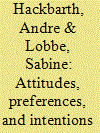

|
|
|
|
|
| Summary/Abstract |
Based on a survey among customers of seven German municipal utilities, we estimate two regression models to identify the most prospective customer segments and their preferences and motivations for participating in peer-to-peer (P2P) electricity trading and develop implications for decision-makers in the energy sector and policy-makers for this currently relatively unknown product. Our results show a large general openness of private households towards P2P electricity trading, which is also the main predictor of respondents' intention to participate. It is mainly influenced by individuals’ environmental attitude, technical interest, and independence aspiration. Respondents with the highest willingness to participate in P2P electricity trading are mainly motivated by the ability to share electricity, and to a lesser extent by economic reasons. They also have stronger preferences for innovative pricing schemes (service bundles, time-of-use tariffs). Differences between individuals can be observed depending on their current ownership (prosumers) or installation probability of a microgeneration unit (consumers, planners). Rather than current prosumers, especially planners willing to install microgeneration in the foreseeable future are considered to be the most promising target group for P2P electricity trading. Finally, our results indicate that P2P electricity trading could be a promising niche option in the German energy transition.
|
|
|
|
|
|
|
|
|
|
|
|
|
|
|
|
| 2 |
ID:
084363
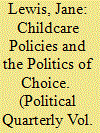

|
|
|
| 3 |
ID:
162943
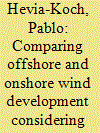

|
|
|
|
|
| Summary/Abstract |
Cost efficient deployment of wind energy is in focus for reaching ambitious targets for renewable energy and transforming the energy supply to one based on renewables. However, as more wind is being deployed the available sites onshore become less attractive in terms of wind conditions and capacity factor and more resistance from population groups affected in the deployment areas results in a reduction of areas that can be developed. We consider three different methods for estimating acceptance costs, one based on compensation and property purchase costs, one based on property value loss near wind turbines, and one based on willingness to pay calculated from a stated preference study. Utilising these methods, we provide an estimation of Levelised Cost of Energy (LCOE) for an expansion of 12 GW onshore or offshore wind capacity in Denmark. We find that the three methods provide similar estimates for local acceptance, but that a high range of uncertainty exists in the upper bound of acceptance costs. Onshore does not have a clear-cut cost advantage over offshore when considering substantial amounts of wind capacity expansion and using high estimates for nation-wide acceptance costs. Moderate onshore wind expansion considering only local acceptance has a cost advantage.
|
|
|
|
|
|
|
|
|
|
|
|
|
|
|
|
| 4 |
ID:
088999
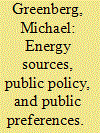

|
|
|
|
|
| Publication |
2009.
|
| Summary/Abstract |
To understand public preferences for energy sources, 2701 US residents were surveyed; 2101 of the respondents lived within 50 miles of a major nuclear facility. Over 90% wanted greater reliance on solar and wind, and over 70% wanted more reliance upon hydroelectric sources. Less than one-third wanted more use of oil and coal. Nuclear and natural gas sources were closer to an even split. Notably, those who lived near nuclear facilities favored the same sources, although a larger proportion of these respondents favored increasing use of nuclear power than in the national sample. These results are consistent with other United States surveys. The study found striking differences in preferences by age, ethnicity/race and other demographic characteristics that need in-depth investigation in order to help decision-makers and everyone else better understand public preferences about energy policy choices.
|
|
|
|
|
|
|
|
|
|
|
|
|
|
|
|
| 5 |
ID:
078783


|
|
|
|
|
| Publication |
2007.
|
| Summary/Abstract |
The main aim of this article is to examine the role-perception and operation of European Commission officials towards Northern Ireland and the peace process. A relative gap in the theoretical literature, until recently, on the Commission's endogenous preferences is highlighted. The main conclusion is that the European Commission's preferences towards conflict resolution in Northern Ireland have altered since 1994 and that Commission officials exhibit a greater analytical understanding and proactive approach to Northern Ireland. The cause of this change has not been socialization into `European' supranational norms, but instead has reflected the impact of British and Irish cooperation and agreement.
|
|
|
|
|
|
|
|
|
|
|
|
|
|
|
|
| 6 |
ID:
111906
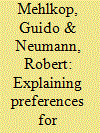

|
|
|
|
|
| Publication |
2012.
|
| Summary/Abstract |
Explanations of different patterns of preferences for redistribution either highlight the role of the institutional framework in a country or highlight the importance of self-interest and rational expectations. The study introduces a unified approach to explain differences in preferences for redistributive measures for the case of intergenerational monetary transfers for families and children. Both explanatory approaches are integrated into the action-based Model of Frame Selection that incorporates normative motives and economic self-interest into the process of decision making. Using a large sample that deals with questions on the approval of public policies for families and accounts for the normative importance of children and family life in Germany, evidence is provided that both approaches are valid in explaining preferences for government transfers.
|
|
|
|
|
|
|
|
|
|
|
|
|
|
|
|
| 7 |
ID:
175471


|
|
|
|
|
| Summary/Abstract |
This article takes advantage of the timing in the implementation of the European Social Survey (ESS) in Israel to assess the impact of political violence on individual attitudes towards trust, institutions and redistribution. The results suggest that a terror attack occurring on the day of an interview positively and significantly improves individual views on interpersonal trust but does not modify views on political and legal institutions. Furthermore, rocket attacks make respondents more likely to support redistribution policies, and unlike terror attacks, have a persistent impact on individual attitudes.
|
|
|
|
|
|
|
|
|
|
|
|
|
|
|
|
| 8 |
ID:
118166
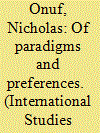

|
|
|
| 9 |
ID:
174768
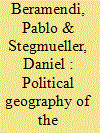

|
|
|
|
|
| Summary/Abstract |
The European Union provided a mixed response to the 2008 financial crisis. On the one hand, it refused to pursue fiscal integration through a common budget; on the other, it introduced significant transfers between countries that were designed to produce financial stabilization. The authors analyze this response as the outcome of democratic constraints on EU leaders. Given the EU’s current institutional structure, citizens’ preferences pose a binding constraint on what leaders can do as these preferences limit the scope of risk-pooling among members and the degree of political tolerance for different courses of action. The authors show that citizens’ preferences reflect differences in the geography of income, production regimes, and institutional organization. The heterogeneity of constituencies’ redistribution preferences combined with a diverse economic geography helps to explain why political constraints on national governments prevent them from engaging in further fiscal integration. By contrast, externalities among member states shift the preferences of citizens who may experience negative effects and make international redistribution politically feasible. The authors analyze these two mechanisms and present novel empirical results on the determinants of preferences for fiscal integration and international redistribution in the aftermath of the eurocrisis.
|
|
|
|
|
|
|
|
|
|
|
|
|
|
|
|
| 10 |
ID:
138765
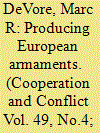

|
|
|
|
|
| Summary/Abstract |
Nothing is more important to Europe’s future as a security actor than supplying its armed forces with modern weaponry. Because individual states lack the research and development budgets and scale economies to remain autarkic, the survival of Europe’s defence-industrial base depends on international cooperation. As in other areas of international affairs, the ability of states to cooperate ‘under anarchy’ is inextricably tied to the existence of international institutions. However, the nature of arms production renders the design of institutions particularly challenging. Problems lie in both the multiplicity of potential cooperative outcomes and the variety of policy tools available. Ultimately, the choice of policies and policy tools can generate friction between the key groups of actors involved in defence-industrial policymaking. This study systematically explores how variations in the structure of international armaments institutions have shaped both the influence of different groups of actors and the nature of collaborative weapons projects. To preview my conclusions, three broad trends can be observed in the evolution of armaments institutions. These are as follows: (1) the gradual incorporation of a larger number of actors into the arms cooperation process; (2) the incremental exclusion of military professionals from armaments institutions; and (3) the growing influence of corporate actors.
|
|
|
|
|
|
|
|
|
|
|
|
|
|
|
|
| 11 |
ID:
098531


|
|
|
|
|
| Publication |
2010.
|
| Summary/Abstract |
It is now widely recognized that effective communication and demand-side policies for alternative energy require sound knowledge of preferences and determinants of demand of the public and consumers. To date, public attitudes towards new transport technologies have been studied under very different conceptual frameworks. This paper gives an overview of the various conceptual frameworks and methodologies used, where four main approaches can be distinguished: general attitudinal surveys, risk perception studies, non-market economic valuation studies, and other approaches such as those based on semiotic theory. We then review the findings of the recent literature on acceptance, attitudes and preferences for hydrogen and fuel cell end-use technologies, focusing on vehicles. These studies are then contrasted with related research into alternative fuel vehicles. The paper finally discusses the main trends in research and avenues for further work in this field. We recommend, among other things, the use of approaches that build knowledge and familiarity with the technology prior to the exploration of attitudes, and the set up of studies that take a whole-systems perspective of hydrogen technologies and that look at hydrogen in the context of other competing clean technologies.
|
|
|
|
|
|
|
|
|
|
|
|
|
|
|
|
| 12 |
ID:
133297
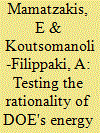

|
|
|
|
|
| Publication |
2014.
|
| Summary/Abstract |
This paper examines the rationality of the price forecasts for energy commodities of the United States Department of Energy's (DOE), departing from the common assumption in the literature that DOE's forecasts are based on a symmetric underlying loss function with respect to positive vs. negative forecast errors. Instead, we opt for the methodology of Elliott et al. (2005) that allows testing the joint hypothesis of an asymmetric loss function and rationality and reveals the underlying preferences of the forecaster. Results indicate the existence of asymmetries in the shape of the loss function for most energy categories with preferences leaning towards optimism. Moreover, we also examine whether there is a structural break in those preferences over the examined period, 1997-2012.
|
|
|
|
|
|
|
|
|
|
|
|
|
|
|
|
|
|
|
|
|